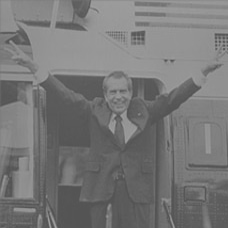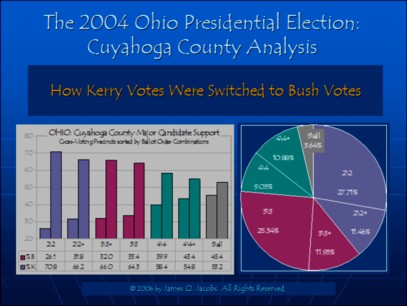|
"I’m Not a Crook" The Public
Face A Discourse |
 |
Two hypothesis are herein tested in relation to private conversations between former United States President Richard M. Nixon and his Chief of Staff, H. R. Haldeman. The first hypothesis is that there is a difference between a politician’s public persona and private reality. This discourse analysis explores the degree of difference between Nixon’s public image, as presented to the American public, and his private conduct as evidenced by secretly recorded conversations (transcripts follow in the Appendix of this article). A second hypothesis is that there should be a difference between the conversation of a superior and a subordinate. Politeness and other social interaction factors in superior and subordinate conversation should be in evidence in the Nixon and Haldeman conversations. Politeness is an important preoccupation in many conversational settings and should be in evidence in deference to a superior. Conversely, a superior might have less preoccupation with politeness to a subordinate.
Method
To test the first hypothesis, that there is a difference between the public "face" of political leaders and their private conversation and conduct, is not ordinarily an easy task. The general public is not ordinarily privileged to the private lives or conversations of public figures. In the Nixon case, there was a secret taping system installed in the White House. Due to the revelations of the Watergate hearings and subsequent legal subpoenas and court decisions, many hours of Nixon’s conversations have been made public. Nixon never intended that the tapes be made public. Therefore they can be reliably considered as private conversations up to the time that the existence of the taping system was revealed to the Watergate investigators.
A search of the Internet produced a number of transcripts of Nixon tapes. Naturally these focus on the evidence of crimes or intent to commit crimes, the cover-up of the Watergate burglary, and the specific events that led to the Watergate hearings, impeachment motions and the resignation of President Nixon. These tapes evidence Nixon’s crimes. The public image Nixon presented to the American people and his denials of illegal activities are well known. Therefore such are not presented herein. Several of the conversations evidencing illegal conduct are. There are more available, but only several are sufficient to demonstrate that Nixon’s private persona is vastly different than his public image. This is not a statistical question.
Many of the transcripts are of President Nixon and his Chief of Staff, H. R. Haldeman. The Nixon and Haldeman conversations are the focus herein. Haldeman, as Chief of Staff, was less subordinate than any other White House staff member. Therefore evidence of subordination in his conversations with the President is herein considered more supportive of the hypothesis than conversations between Nixon and the other White House staff would be. Also, analysis of conversation with only one person, rather than many at once, is considered as likelier to reveal the superior and subordinate relationship. When a hierarchy of many people is analyzed, the relationships can be more complex and even contradictory, with several speakers being both superiors and subordinates to the others present. To avoid this complexity, I have focused on just the Nixon and Haldeman relationship. In only one of the sessions presented two other speakers are present and have only a minor role.
More than 20 minutes of conversations were analyzed for the following factors: number of turns, number of words and characters, words per turn, number of profanities and expletives, addressing by and use of personal pronouns, use of first names, use of formal address, and number of interruptions. The conversations are divided into sessions. Several of the sessions are typified by Nixon directing activities and several are of Haldeman reporting on activities and persons. The number of words are compared for these two types of discourse.
Analysis
In the Appendix the transcripts of the conversations are presented. On Appendix page one several crimes by Nixon are evidenced. Long before the Watergate burglary Nixon ordered a break-in at the Brookings Institute. He also discussed destroying the tapes, an obstruction of justice. In the first conversation he directs Haldeman to use the powers of the government to harass political opponents who are Jewish. These acts are contrary to the President’s constitutional duty to uphold the law. There are other such instances evidenced by other tapes. These few conversations with Haldeman are sufficient evidence of Nixon’s private criminal conduct. They are not the only ones, but sufficient herein to evidence the first hypothesis.
Analysis of the conversations in the Appendix also evidence another disparity between Nixon’s public and private images. One of every sixty words Nixon uttered was a profanity. Nixon’s profanities included damn, Goddam or Goddamit, son of a bitch, son of a bitching, hell, asshole, crap and several deleted expletives, all words inappropriate in public political speeches. Another very inappropriate Nixon action was his focus on Jewish contributors to the Democratic party. This singling out of a religious/ethnic group is a type of bigotry that is intolerable in the public arena. The vast difference in Nixon’s private behavior is striking in these few examples.
The results of the discourse analysis are displayed in the following table.

Regarding the second hypothesis, ample differences in the conversations of the superior and the subordinate are evidenced. The most striking support of the hypothesis is in the number of interruptions. Nixon interrupts his subordinate 23 times, compared to Haldeman interrupting Nixon only twice. Also supportive is the fact that Nixon addressed Haldeman by his first name four times and called him "boy" twice, while Haldeman called Nixon "sir" four times. There is even a difference in addressing each other with the personal pronoun "you." Nixon said "you" twice as often, 44 times compared to 22. Nixon also said "I" nearly twice as often, 54 times compared to 29. Nixon used 23 profanities compared to 2 by Haldeman. Haldeman was certainly far more polite than Nixon. The following chart takes into account the number of words spoken and presents each category’s results as a percentage of total words. This is therefore an accurate representation of the ratios, rather than just a tally of instances.

I have divided the conversations into two types. In one type Nixon is directing Haldeman, and in the other type Haldeman is reporting to Nixon. In the two sessions of Haldeman reporting to Nixon, Haldeman speaks about three times more words than Nixon, 1245 and 431 words respectively. When Nixon is directing his subordinate he speaks more. In the other sessions Nixon uses 955 words compared to 537 by Haldeman.
Interpretation
In the secretly recorded, private White House conversations a far different persona is evidenced that the one Nixon presented to the public. The transcripts reveal that Nixon was a criminal unrestrained by the law. At the same time he was reelected by a landslide. Obviously the image Nixon projected to the public was believed and was effective. In the case of Richard M. Nixon, public denials of involvement in the Watergate break-in and its subsequent cover-up were believed by the general public. Statements like "I’m not a crook," and other denials of wrongdoing, in combination with the persona Nixon presented to the electorate, influenced the course of American politics. If the people of the United States had known the private Nixon and the truth of the private Nixon conversations he would probably not have been reelected.
The hypothesis that there is a difference in the discourse of superiors and subordinates is also well supported by the data. Herein the subordinate person is shown to be more polite, more formal in address, and less likely to use obscene language. The superior is far more likely to interrupt the subordinate, to use first names, to use the pronoun reference "you," and to refer to himself more frequently with the term "I." None of the data contradicts the hypothesis.
Regarding the number of words, the evidence indicates that this is related, at least in part, to the function of the conversation. Nixon used more words when directing subordinates and fewer words when receiving a report. A larger body of material would be useful in assessing if the number of words spoken by the parties had any particular significance beyond the role of the conversation. The tally of the total numbers of words are herein used only to analyze the speakers percentages. They do not seem to offer useful supportive evidence for either hypothesis.
Conclusion
No conclusions are based on the number of turns or words spoken, except that they evidence the role of the conversation.
The Nixon tapes show us that it is certainly possible to control what others, even an entire nation, thinks about you. The control of discourse can serve as a deception of the electorate. The private and public personas of political figures can be immensely disparate. The electorate should always assume that the private persona of a political figure, especially the President, is not the same as the public image.
Conversations between superiors and subordinates supply ample evidence of their different roles. The subordinate is far more polite that the superior. Although only one set of participants is analyzed herein, similar results should be anticipated in other studies. Given the distinct pattern observed herein, I suspect that it is possible to distinguish the superior and subordinate roles of conversation participants, even when these roles are not previously known, simply by statistical analysis using the category of interruptions and the categories of uses of first names and formal address.
